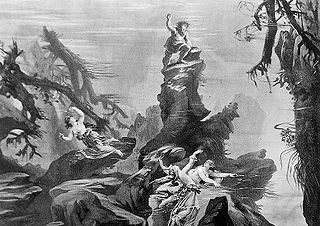
Der Ring des Nibelungen, WWV 86, is a cycle of four German-language epic music dramas composed by Richard Wagner. The works are based loosely on characters from Germanic heroic legend, namely Norse legendary sagas and the Nibelungenlied. The composer termed the cycle a "Bühnenfestspiel", structured in three days preceded by a Vorabend. It is often referred to as the Ring cycle, Wagner's Ring, or simply The Ring.
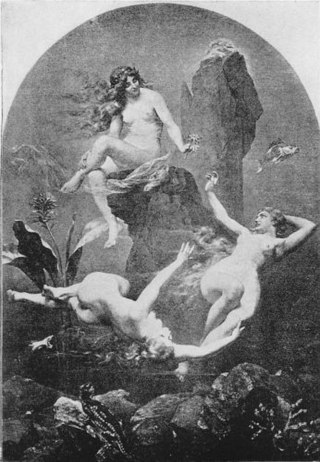
The Rhinemaidens are the three water-nymphs who appear in Richard Wagner's opera cycle Der Ring des Nibelungen. Their individual names are Woglinde, Wellgunde and Flosshilde (Floßhilde), although they are generally treated as a single entity and they act together accordingly. Of the 34 characters in the Ring cycle, they are the only ones who did not originate in the Old Norse Eddas. Wagner created his Rhinemaidens from other legends and myths, most notably the Nibelungenlied which contains stories involving water sprites (nixies) or mermaids of the Danube.

The Nordwestdeutsche Philharmonie is a German symphony orchestra based in Herford. It was founded in 1950 and, along with Philharmonie Südwestfalen and Landesjugendorchester NRW, is one of the 'official' orchestras (Landesorchester) of the state of North Rhine-Westphalia. The orchestra has been shaped by conductors such as Wilhelm Schüchter, Hermann Scherchen and Andris Nelsons. They have regularly served several cities in northwest Germany, and toured internationally to halls such as Berliner Philharmonie, Tonhalle Zürich and Großes Festspielhaus in Salzburg, also to the U.S. and Japan.

Stadttheater Minden is a municipal theatre in Minden, North Rhine-Westphalia, Germany. The theatre has no ensemble, but stages some productions of its own. It became known for a Wagner project culminating in Der Ring in Minden.
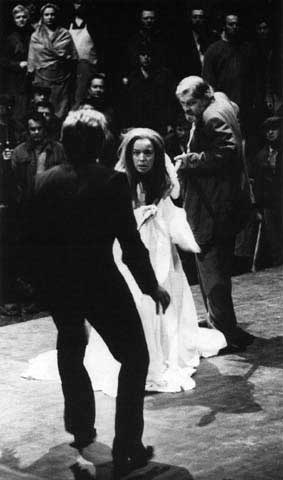
The Jahrhundertring was the production of Richard Wagner's Ring cycle, Der Ring des Nibelungen, at the Bayreuth Festival in 1976, celebrating the centenary of both the festival and the first performance of the complete cycle. The festival was directed by Wolfgang Wagner and the production was created by the French team of conductor Pierre Boulez, stage director Patrice Chéreau, stage designer Richard Peduzzi, costume designer Jacques Schmidt and lighting designer André Diot. The cycle was shown first in 1976, then in the following years until 1980. It was filmed for television in 1979 and 1980. While the first performance caused "a near-riot" for its brash modernity, the staging established a standard, termed Regietheater, for later productions.
Norma Sharp is an American operatic soprano. She is known for singing Mozart and Richard Strauss, but also sang Wagner roles at the Bayreuth Festival. She worked mostly in Germany, made an international career, and has been a professor of voice at the Hochschule für Musik "Hanns Eisler" from 1992.

Maria Friderike Radner was a German contralto who performed internationally in opera and in concerts. She studied at the Robert Schumann Hochschule in Düsseldorf. She was described as an "extremely talented interpreter of Wagner's music" by Stern magazine and Abendzeitung. Possessing the "rare pitch of a true alto", she frequently appeared as Erda in Wagner's Der Ring des Nibelungen at the Leipzig Opera, Schwertleite in Die Walküre at the Teatro Comunale di Firenze with Zubin Mehta, and in Mahler's Symphony No. 2 (Resurrection) conducted by Antonio Pappano in Rome and Milan. Her debut at the Metropolitan Opera in 2012 in Götterdämmerung was part of that company's documentary Wagner's Dream.

Andreas Schager is an Austrian operatic tenor. He began his career as a tenor for operettas, but has developed into singing Heldentenor parts by Richard Wagner including Tristan, Siegmund, Siegfried and Parsifal. A member of the Staatsoper Berlin, he has appeared internationally at venues including La Scala, The Proms and the Bayreuth Festival.
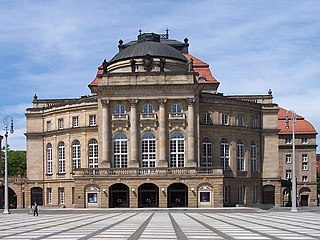
Frank Beermann is a German conductor. He was Generalmusikdirektor (GMD) at the Chemnitz Opera for several years, and has worked freelance at international opera houses from 2012. He has conducted premieres and recordings of rarely performed operas and orchestral works.
Dara Kristin Hobbs is an American operatic soprano, who has appeared internationally, mostly in European opera houses. Her repertoire has focused on dramatic soprano roles, such as Wagner's Isolde and Strauss' Ariadne. She appeared as Wagner's Brünnhilde in Der Ring in Minden.
Matthias von Stegmann is a German actor, voice-over speaker and writer, author and stage director for theatre and especially opera who works internationally. He wrote dialogue and directed it for German versions of American series such The Simpsons. In opera, he has focused on the work of Richard Wagner. He staged a version of his Der Ring des Nibelungen for children, first in Tokyo, then in German at the Vienna State Opera and in Zurich. He staged in 2012 Tristan und Isolde in Minden, and in 2013 the first performance of Rienzi at the Bayreuth Festival.

Jutta Hanna Edith Hering-Winckler is a German lawyer and patron of music. Since 1977, she has been head of a law firm in Minden as a lawyer and notary. Since 1999, she has been president of the Richard Wagner Society in Minden. She received awards for her civic engagement as the driving force of the Wagner project at the Stadttheater Minden, particularly Der Ring in Minden, which brought her hometown to international recognition.
Thomas Mohr is a German operatic tenor and academic voice teacher. He began his career as a baritone, but moved on to heldentenor and has performed roles in all tenor parts of Wagner's Der Ring des Nibelungen at Der Ring in Minden. He has appeared at major international opera houses and concert halls, and made recordings. Mohr is a professor of voice at the Hochschule für Künste Bremen. He also runs an agricultural estate where he founded a music festival.
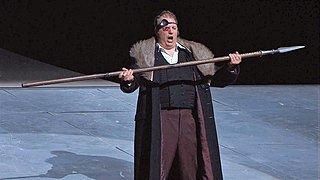
Renatus Mészár is a German operatic bass who has performed leading roles such as Wotan in Wagner's Der Ring des Nibelungen at major opera houses and festivals. Now a member of the Badisches Staatstheater Karlsruhe, he appeared in the world premiere of Avner Dorman's Wahnfried and the first recording of Bruno Maderna's Requiem.
Kathrin Göring is a German operatic mezzo-soprano, a member of the Oper Leipzig who has appeared at other major opera houses, also in concert and recital, and made recordings. She has appeared in Leipzig in leading roles such as Bizet's Carmen and Wagner's Parsifal. She sang both Fricka and Waltraute in Der Ring in Minden.
Tijl Faveyts is a Belgian operatic bass. A current member of the Komische Oper Berlin, he has performed leading roles such as Mozart's Sarastro and Hunding in Wagner's Die Walküre and Gurnemanz Parsifal at major opera houses, concert halls and festivals, and made recordings.
Frank Philipp Schlößmann is a German scenic designer focused on operas who has worked at major opera houses and festivals internationally. He staged Janáček's Jenůfa at the Metropolitan Opera, Wagner's Der Ring des Nibelungen at both the Bayreuth Festival and Der Ring in Minden, and the world premiere of Heinz Holliger's Lunea at the Opernhaus Zürich.
Jeff Martin is an American operatic tenor who made a career based in Germany, singing at international opera houses and concert halls. Focused on character roles, he has appeared as Mime in Wagner's Der Ring des Nibelungen and Herod in Salome by Richard Strauss, and appeared in several world premieres.
Heiko Trinsinger is a German operatic baritone. A member of the Aalto Theatre in Essen, he has performed leading roles at major houses, such as Mozart's Papageno and Wagner's Alberich.
Julia Bauer is a German operatic coloratura soprano who has appeared at major opera houses and also in concert and recital. She has had leading roles such as Zerbinetta and Lulu, and was Freia, Helmwige, Forest Bird, Woglinde and Third Norn in Der Ring in Minden.










